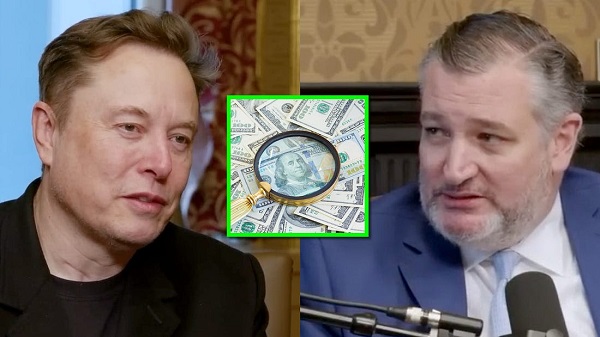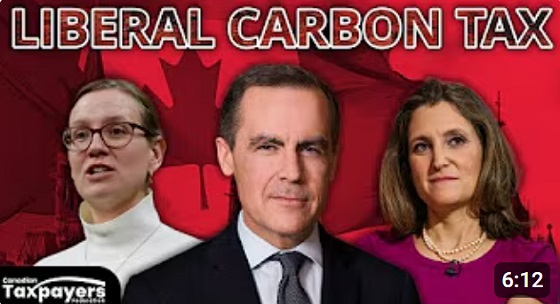Business
Elon Musk Exposes the System Keeping Government Fraud Alive

The only way to reconcile the databases and get rid of waste and fraud is to actually look at the computers and see what’s going on.
Elon Musk just pulled back the curtain on what’s really fueling government waste and fraud. Speaking with Senator Ted Cruz, he revealed there are at least 14 “magic money computers” that can “send money out of nothing,” meaning these government systems are issuing trillions in payments with little oversight or real-time accountability.
Musk explained that these computers don’t operate in a way where they “talk to each other.” Instead, Musk explained they function in a way that allows money to move through government agencies unchecked, sometimes in ways that don’t align with official records.
The numbers lawmakers see aren’t always accurate, with government books potentially off by 5% to 10%. That could mean up to hundreds of billions in taxpayer dollars are misallocated or disappearing, while the actual financial activity remains hidden deep inside these systems.
Join 100K+ Substack readers and 1.6 million 𝕏 users who follow the work of Vigilant Fox.
Subscribe for top-tier news aggregation and exclusive stories you won’t find anywhere else.
“So you may think that the government computers all talk to each other. They synchronize, they add up what funds are going somewhere, and it’s coherent that the numbers, for example, that you’re presented as a senator are actually the real numbers. They’re not,” Musk explained.
“They’re not totally wrong,” he continued. “They’re probably off by 5% or 10% in some cases. So I call it Magic Money Computer. Any computer which can just make money out of thin air. That’s Magic Money.”
“So how does that work?” Ted Cruz asked.
“It just issues payments,” Musk answered. “I think we found now 14 magic money computers. They just send money out of nothing.”
This raises a critical question: If the government’s books are off by 5% to 10% in some cases, leaving up to hundreds of billions of dollars unaccounted for, where is all that money actually going?
 |
Image: Shutterstock / Deacons docs
On a related note, Elon Musk has previously called government-funded NGOs one of the biggest scams in history, saying they take hundreds of billions in taxpayer dollars with little accountability, leading to massive waste and misallocation.
He estimates that up to $700 billion per year is funneled through these so-called nonprofits, many of which he claims are nothing more than money laundering operations disguised as charity.
Instead of focusing on bureaucratic structures, Musk believes the key to understanding waste, fraud, and financial manipulation is to go straight to the source: the computers handling the payments.
Musk previously said something to the effect, “I don’t want a job in Washington. All I want is the login for every computer.”
Musk explained that policy decisions eventually filter down to computers for implementation.
The problem? These systems are buried under layers of bureaucracy, making it nearly impossible for lawmakers—or even agency heads—to track where the money is actually going in real-time.
He explained, “The government is run by computers. So you’ve got essentially several hundred computers that effectively run the government. So when somebody, like, even when the President issues an executive order, that’s got to go through a whole bunch of people until ultimately it is implemented at a computer somewhere,” Musk explained.
“And if you want to know what the situation is with the accounting and you’re trying to reconcile accounting and get rid of waste and fraud, you must be able to analyze the computer databases. Otherwise, you can’t figure it out because all you’re doing is asking a human who will then ask another human, ask another human, and finally usually ask some contractor who will ask another contractor to do a query on the computer,” Musk lamented.
“That’s how it actually works,” he stressed. “So it’s many layers deep. So the only way to reconcile the databases and get rid of waste and fraud is to actually look at the computers and see what’s going on. That’s what I sort of cryptically referred to, reprogramming the matrix. You have to understand what’s going on in the computers. You have to reconcile the computer databases in order to identify the waste of fraud.”
Watch the full conversation below:
A little bit about me.
I was a healthcare veteran until Biden’s vax mandates hit America. That’s when I became a citizen journalist.
Since then, I’ve clipped thousands of videos featuring dissident doctors dismantling the COVID narrative, amassing billions of views. If you’ve followed the COVID scam, there’s a good chance you’ve seen my work.
On another note! I need your input!
Big things are happening! This Substack is evolving fast. I’m ramping up production, expanding the team, and working hard to bring you the best content possible.
The more support this page gets, the better the user experience becomes. If you’re enjoying the work here, consider becoming a paid subscriber. Your support truly makes a difference.
Anyway, I want to know what kind of content you enjoy the most. And what topics should I focus on for exclusive, subscriber-only stories?
|
Check out exclusive content for paid subscribers here. More coming soon!
Invite your friends and earn rewards
2025 Federal Election
MEI-Ipsos poll: 56 per cent of Canadians support increasing access to non-governmental healthcare providers

-
Most believe private providers can deliver services faster than government-run hospitals
-
77 per cent of Canadians say their provincial healthcare system is too bureaucratic
Canadians are increasingly in favour of breaking the government monopoly over health care by opening the door to independent providers and cross-border treatments, an MEI-Ipsos poll has revealed.
“Canadians from coast to coast are signalling they want to see more involvement from independent health providers in our health system,” explains Emmanuelle B. Faubert, economist at the MEI. “They understand that universal access doesn’t mean government-run, and that consistent failures to deliver timely care in government hospitals are a feature of the current system.”
Support for independent health care is on the rise, with 56 per cent of respondents in favour of allowing patients to access services provided by independent health entrepreneurs. Only 25 per cent oppose this.
In Quebec, support is especially strong, with 68 per cent endorsing this change.
Favourable views of accessing care through a mixed system are widespread, with three quarters of respondents stating that private entrepreneurs can deliver healthcare services faster than hospitals managed by the government. This is up four percentage points from last year.
Countries like Sweden and France combine universal coverage with independent providers and deliver faster, more accessible care. When informed about how these health systems run, nearly two in three Canadians favour adopting such models.
The poll also finds that 73 per cent of Canadians support allowing patients to receive treatment abroad with provincial coverage, which could help reduce long wait times at home.
Common in the European Union, this “cross-border directive” enabled 450,000 patients to access elective surgeries in 2022, with costs reimbursed as if they had been treated in their home country.
There’s a growing consensus that provincial healthcare systems are overly bureaucratic, with the strongest agreement in Alberta, B.C., and Quebec. The proportion of Canadians holding this view has risen by 16 percentage points since 2020.
Nor do Canadians see more spending as being a solution: over half say the current pace of healthcare spending in their province is unsustainable.
“Governments shouldn’t keep doubling down on what isn’t working. Instead, they should look at what works abroad,” says Ms. Faubert. “Canadians have made it clear they want to shift gears; now it’s up to policymakers to show they’re listening.”
A sample of 1,164 Canadians aged 18 and older was polled between March 24th and March 28th, 2025. The margin of error is ±3.3 percentage points, 19 times out of 20.
The results of the MEI-Ipsos poll are available here.
* * *
The MEI is an independent public policy think tank with offices in Montreal, Ottawa, and Calgary. Through its publications, media appearances, and advisory services to policymakers, the MEI stimulates public policy debate and reforms based on sound economics and entrepreneurship.
2025 Federal Election
POLL: Canadians say industrial carbon tax makes life more expensive

The Canadian Taxpayers Federation released Leger polling showing 70 per cent of Canadians believe businesses pass on most or some of the cost of the industrial carbon tax to consumers. Meanwhile, just nine per cent believe businesses pay most of the cost.
“The poll shows Canadians understand that a carbon tax on business is a carbon tax on Canadians that makes life more expensive,” said Franco Terrazzano, CTF Federal Director. “Only nine per cent of Canadians believe Liberal Leader Mark Carney’s claim that businesses will pay most of the cost of his carbon tax.
“Canadians have a simple question for Carney: How much will your carbon tax cost?”
The federal government currently imposes an industrial carbon tax on oil and gas, steel and fertilizer businesses, among others.
Carney said he would “improve and tighten” the industrial carbon tax and extend the “framework to 2035.” Carney also said that by “changing the carbon tax … We are making the large companies pay for everybody.”
The Leger poll asked Canadians who they think ultimately pays the industrial carbon tax. Results of the poll show:
- 44 per cent say most of the cost is passed on to consumers
- 26 per cent say some of the cost is passed on to consumers
- 9 per cent say businesses pay most of the cost
- 21 per cent don’t know
Among those decided on the issue, 89 per cent of Canadians say businesses pass on most or some of the cost to consumers.
“Carbon taxes on refineries make gas more expensive, carbon taxes on utilities make home heating more expensive and carbon taxes on fertilizer plants increase costs for farmers and that makes groceries more expensive,” Terrazzano said. “A carbon tax on business will push our entrepreneurs to cut production in Canada and increase production south of the border and that means higher prices and fewer jobs for Canadians.”
-

 2025 Federal Election2 days ago
2025 Federal Election2 days agoNo Matter The Winner – My Canada Is Gone
-

 2025 Federal Election2 days ago
2025 Federal Election2 days agoASK YOURSELF! – Can Canada Endure, or Afford the Economic Stagnation of Carney’s Costly Climate Vision?
-

 Alberta2 days ago
Alberta2 days agoMade in Alberta! Province makes it easier to support local products with Buy Local program
-

 2025 Federal Election2 days ago
2025 Federal Election2 days agoCSIS Warned Beijing Would Brand Conservatives as Trumpian. Now Carney’s Campaign Is Doing It.
-

 Alberta2 days ago
Alberta2 days agoProvince to expand services provided by Alberta Sheriffs: New policing option for municipalities
-

 2025 Federal Election1 day ago
2025 Federal Election1 day agoInside Buttongate: How the Liberal Swamp Tried to Smear the Conservative Movement — and Got Exposed
-

 Bruce Dowbiggin1 day ago
Bruce Dowbiggin1 day agoIs HNIC Ready For The Winnipeg Jets To Be Canada’s Heroes?
-

 Dr. Robert Malone1 day ago
Dr. Robert Malone1 day agoThe West Texas Measles Outbreak as a Societal and Political Mirror















